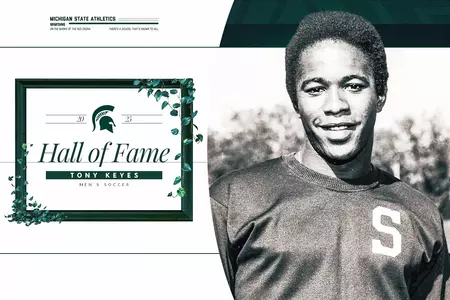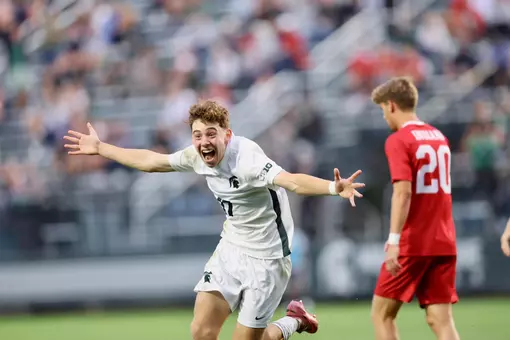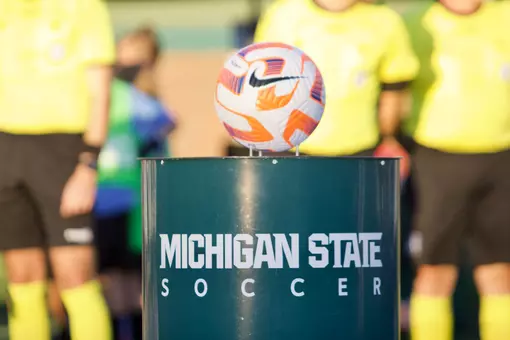Michigan State University Athletics

Kenneth "Tony" Keyes Set for MSU Hall of Fame Induction
9/10/2025 4:46:00 PM | Men's Soccer
Along with four other standout student-athletes and one iconic coach, Michigan State men's soccer player Kenneth" "Tony Keyes has been selected for induction into the Michigan State Athletics Hall of Fame.
The Hall of Fame Induction Ceremony and Celebration will take place on Friday, Sept. 12. There will also be a special recognition of the 2025 MSU Athletics Hall of Fame Class during the Michigan State-Youngstown State football game at Spartan Stadium on Saturday, Sept. 13. The MSU Athletics Hall of Fame, located in the Clara Bell Smith Student-Athlete Academic Center, opened on Oct. 1, 1999, and displays plaques of the 187 previous inductees. The charter class of 30 former Spartan student-athletes, coaches and administrators was inducted in 1992.
Kenneth "Tony" Keyes
Men's Soccer (1966-68)
Kingston, Jamaica
Nearly 60 years after he played in East Lansing, Kenneth "Tony" Keyes continues to be the most prolific scorer in Michigan State men's soccer history. The story of Michigan State soccer cannot be told without also telling the tale of Tony Keyes. His lasting impact can be felt on the Spartan pitch to this day.
Upon finding out that he was joining the 2025 Michigan State Athletics Hall of Fame class, Keyes couldn't wait to spread the news.
"I was very ecstatic and very elated. I told my wife immediately, and she started calling my son and my daughter, and everybody, so we're all excited. We're looking forward to the event," Keyes said.
He will be joining some of the biggest names in MSU soccer history, including fellow Jamaican Trevor Harris, as well as Guy Busch and Joe Baum, who were all teammates.
"It means a lot, because I know all these people personally, so that makes a very big difference," Keyes said. "We're friends, and I know them all, and it was a good incentive for me to be looking forward to it one day if I got into the Hall of Fame. I will be in very good company."
Keyes was part of the pipeline of players from Kingston, Jamaica, to play for head coach Gene Kenney and the Spartans in the late 1960s, including Harris, Frank Morant and Les Lucas. All four prepped at Kingston College together, but it was another Jamaican, Payton Fuller (1963-65), who convinced Coach Kenney that Keyes needed to wear the Green & White.
Kenney needed some convincing that the undersized Keyes could compete at the Division I level.
"Yes, well, my first day at MSU, and the first practice, we had the coach, Gene Kenney, seeing me for the first time, and I'm not a very big guy," Keyes said. "I'm just 5-7 and a half, and he saw me and said 'Oh no, I made a mistake with that scholarship. He's not going to be able to play against Army and Navy and so on and so forth.' But guess what? After the first practice, I earned the respect of everyone, and from that day forward, it was the greatest thing for me. I knew everybody on the team, both varsity and freshmen. My life at MSU was very good after that first day. So that stood out for me."
The Kingston, Jamaica, native is still second in the Michigan State record books with 129 points and stands first in all-time goals scored with 56 from 1966-68.
Keyes started his Spartan career with a bang in 1966, earning the first of two All-American honors as a sophomore. In 1966, he was second on the team in points scored behind fellow MSU Hall of Fame Inductee Guy Busch. Keyes scored 21 goals that season which still stands as fifth-most in MSU history. He also tied the single-game record with five assists against Purdue. The Spartans reached the national semifinals in 1966, tying Long Island, 2-2 with LIU advancing on corner kicks.
During the 1967 campaign, Keyes battled through a hamstring injury that kept him sidelined for the last half of the season. The Spartans outscored their opponents, 73-11, and finished with a stellar record of 12-0-2. They settled a score with Long Island with a 4-0 win in the NCAA semifinals. Michigan State would share the NCAA Championship with St. Louis after the national title game was canceled due to weather.
"After my first year playing varsity for Michigan State, I said to the coach, 'if you want to win the NCAA Championships, then you have to send to Jamaica to get Trevor Harris. We both went to the same high school, and we played together,'" Keyes explained. "So, I told the coach, you guys have to go get this guy so we can win this championship. And so, he listened to me and made it happen. In 1967, we won the first championship in soccer for MSU, even though the game was postponed because of weather conditions. But that was a very, very great feeling, because we've been to the Final Four before, but we've never been able to get over the hump. And then the second year, when we went in 1968 which was the year I captained the team, that was a great, great feeling, too, because it's never been done at MSU before. And then to do it back-to-back, was quite an achievement."
In 1968, Keyes scored 28 goals, which still stands as the single-season record at MSU, as the Spartans battled to an 11-1-3 record. In the national semifinal, Michigan State defeated Brown, 2-0, to return to the title contest. With a 2-2 draw against Maryland in the national title match, the Spartans repeated as co-champions. The Spartan captain once again captured All-American honors that season.
The kinship that Keyes felt with his fellow countrymen was also an important part of the journey.
"We had very good understanding because Trevor Harris and I had been playing together on high school teams since we were about 13-years old," Keyes said. "So, I've known him all my life. He's my best friend. And then Payton Fuller, who was also an All-American soccer player, and he told Gene Kenney about me. And that was when he started recruiting me from Jamaica. So, playing with my fellow countrymen, that felt really good, because I was far away from home."
After his time on the pitch was done, Keyes went on to become a dentist. He earned his doctorate of dental surgery from Howard in 1976. He also went back to Jamaica treating school-aged children. He returned to Michigan practicing dentistry in Grand Rapids before earning a master's degree of public health from Johns Hopkins in 1986. He worked at Children's National Hospital in Washington, D.C. for over 20 years before retiring.
According to Keyes, none of the accolades of success would have been possible if it weren't for his wife Geri, who he met at Michigan State.
"As a matter of fact, she saved my life in 1967 when I had an appendicitis situation, and everybody was gone for the Thanksgiving weekend, and I was at home, really dying. And she took me to Olin Health Center, and they had to do emergency surgery," Keyes said.
Aside from his family, Keyes thanks all of his coaches from Jamaica to Kenney at Michigan State, and all the friends and the teammates along the way who helped shape the man that he would become today: an MSU Athletics Hall of Famer.



